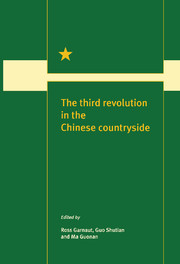Book contents
- Frontmatter
- Contents
- Figures
- Maps
- Tables
- Contributors
- Preface
- 1 The third revolution
- Feeding the people
- Marketing and price reform
- 6 Price reform for agricultural products
- 7 Grain marketing: from plan to market
- 8 Fertiliser price
- 9 Agricultural wholesale markets
- 10 The ‘wool war’ and the ‘cotton chaos’: fibre marketing
- 11 Conflict over cabbages: the reform of wholesale marketing
- Internationalisation
- Regional issues
- Institutional change
- References
- Index
10 - The ‘wool war’ and the ‘cotton chaos’: fibre marketing
from Marketing and price reform
Published online by Cambridge University Press: 04 August 2010
- Frontmatter
- Contents
- Figures
- Maps
- Tables
- Contributors
- Preface
- 1 The third revolution
- Feeding the people
- Marketing and price reform
- 6 Price reform for agricultural products
- 7 Grain marketing: from plan to market
- 8 Fertiliser price
- 9 Agricultural wholesale markets
- 10 The ‘wool war’ and the ‘cotton chaos’: fibre marketing
- 11 Conflict over cabbages: the reform of wholesale marketing
- Internationalisation
- Regional issues
- Institutional change
- References
- Index
Summary
Textile fibres are at once a major source of farm output and income (ranking after grain), and a major input into industrial production (ranking after coal and oil). The textile industries have contributed the largest component of the increase in industrial production in both urban and rural areas since the commencement of reform. Production, trade and utilisation of natural textiles is thus an important part of the story of the Chinese rural economy in the reform period, interacting with agriculture, rural industry, trade between rural and urban areas, and economic exchange between the farms and township and village enterprises.
A study of the production, trade and absorption of natural textile fibres illustrates many of the problems and contradictions of China's partially reformed economic system. Nowhere were the contradictions more costly, or revealed more dramatically, than in the struggle that emerged in the late 1980s for possession of the rents generated by controlled and distorted markets for natural fibres. These came to be known in China as the ‘wool war’ and the ‘cotton chaos’.
A highly competitive and internationally oriented processing industry co-existed alongside problems in the supply of raw material. Constraints on local production of raw materials were not the problem, as natural fibres are internationally tradable, and the textiles and clothing sector has been a net importer of raw materials. Access to the world market permits a separation between the fibre production stage and the processing stage.
- Type
- Chapter
- Information
- The Third Revolution in the Chinese Countryside , pp. 120 - 143Publisher: Cambridge University PressPrint publication year: 1996

